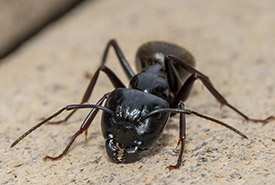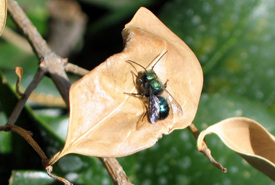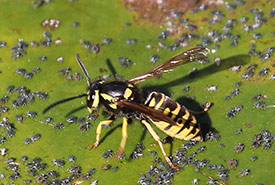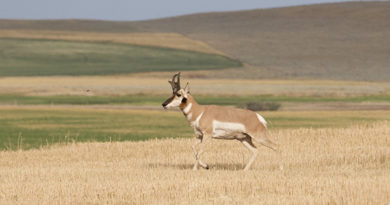NCC: Land Lines – Appreciating insects this World Animal Month

Eastern black carpenter ant (Photo by Wally Simpson, CC BY-NC 4.0)
October is World Animal Month, a time for us to reflect on the important roles that animals play in our lives. Animals are an integral part of human existence, and this month gives us a chance to appreciate their presence and create solutions for the current threats they face.
A wide range of wildlife can be seen or heard in my yard on any given day. Birds, squirrels, chipmunks and rabbits are frequent visitors here, adding a sense of charm to my ordinary living space. Each of these species is essential to our ecosystem in their own unique way, on top of being a source of enjoyment for humans.

Blue orchard bee (Photo by Robert Engelhardt)
However, not all animals have qualities that make it immediately apparent what their purpose is. Some insects have a reputation for being pests to those trying to enjoy their time outdoors. Mosquitos bite, wasps sting, flies annoy and spiders are scary (to some). I decided to learn more about the benefits that some of these commonly observed insects provide, instead of focusing on their negative impacts on humans.
Mosquitos don’t pose many direct benefits to humans, but they are beneficial to other animals. They are a valuable food source for birds, bats, reptiles, fish and frogs, as well as other insects. I didn’t realize that adult mosquitos are also pollinators, feeding from plant nectar and ultimately helping with the reproduction of plant life.

Prairie yellowjacket (Photo by Terry Carr, CC BY-NC 4.0)
Wasps are another insect that humans generally want to distance themselves from. But as I learned, their territorial tendencies are quite useful. Wasps help to control pest populations by preying on leaf beetle larvae, caterpillars and flies. Like mosquitos, wasps are valuable pollinators and are an important part of helping control pest populations.
Ants busily scurry around many parts of my patio, driveway and walkways. It seems like they are constantly growing in numbers, and I really didn’t know much about them before doing some research. It turns out that ants are essential in keeping our environment clean, by eating organic waste and dead animals. They help return nutrients from dead organisms back into the soil, which benefits a new cycle of living organisms. Ants also help aerate the soil by digging tunnels and loosening up dirt with their movements. Aeration helps promote plant growth, as these tunnels carry water, oxygen and nutrients to their roots. In addition, ants also help disperse seeds and provide pest control and food for other wildlife.
Insects provide many benefits to our health, from pollinating plants and aerating soil to pest control and providing food for wildlife. The next time you’re sitting outside, take a moment to appreciate these tiny creatures and their benefits to the Earth.




